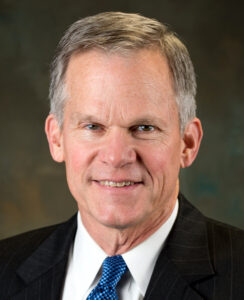Writer: Max Crampton-Thomas
 2 min read March 2021 — Campbell University is a private, faith-based university with historic ties to the Baptist Church. It was founded in 1887 by Baptist Minister J.A. Campbell. President J. Bradley Creed spoke with Invest: about the transition to remote schooling, enrollment and the landscape for philanthropy.
2 min read March 2021 — Campbell University is a private, faith-based university with historic ties to the Baptist Church. It was founded in 1887 by Baptist Minister J.A. Campbell. President J. Bradley Creed spoke with Invest: about the transition to remote schooling, enrollment and the landscape for philanthropy.
How was the transition to remote instruction for the university and what were the lessons learned?
This last year has posed a major challenge to the higher education sector that nobody anticipated. Rather quickly, we shifted from strategic planning to scenario planning. We sent students home last spring and were able to transition fairly seamlessly to hybrid and online instruction, mainly because we have offered degrees online for the last seven years. In the fall of 2020, we started the semester on campus and we were able to finish the semester on campus. We think this was a major accomplishment. We’ve seen the advantage of having a medical school and health science professionals who not only understand virology and epidemiology but also the public health dimension of this virus. In January 2021, we conducted full testing of students returning for the spring semester with only a 1% positivity rate. We are still monitoring this very closely.
What impact did the pandemic have on enrollment figures?
Last fall, there was very little impact. After the pandemic hit, we had more entering students than we had in 2019 intakes. The enrollment for fall 2021 will be a challenge. Our applications and deposits are down compared to last year, which is true across the board in private higher education. Declining enrollments will have an impact but we have been remarkably disciplined with our financial management, so we are keeping pace. Some schools are concerned about fall graduate enrollment but we’ve seen positive numbers in our graduate and professional programs.
What are some of the fastest-growing areas of study for the university?
Campbell has been in a steady pattern of expansion over the last 40 years based on adding new programs. Anything related to health sciences at the undergraduate level is in high demand. Our business major has remained strong. We have the oldest Trust and Wealth Management program in the nation. We recently started a new program in engineering that has attracted students as well as a homeland security program. Most of the traditional undergraduate arts and science majors, such as English, political science and chemistry, are stable. Our law school is only 40 years old but we now have Campbell attorneys in 97 out of 100 counties in this state. We anticipate making a similar impact with our medical school graduates.
How has your partnership with Cape Fear Valley Health evolved?
We place great importance on collaboration and partnerships. Campbell started a school of osteopathic medicine eight years ago. We do not own or operate a hospital, so we depend on partnerships to deliver our clinical education and establish medical residencies. Cape Fear Valley is one of our key partners, so we do many of our clinical rotations for third- and fourth-year medical students there, as well as rotations for other health science programs such as pharmacy. We’ve also established graduate medical education residency programs with Cape Fear Valley. Campbell is committed to doing its part in addressing the shortage of primary care providers in the state and in the nation.
How has the philanthropy landscape changed in the current landscape?
We just completed the most successful year ever in fundraising. In the last several years, we have seen an increase every year in the number of individual gifts and the number of individual donors. We’ve been forthright with our alumni and donors about our needs during this time because we have incurred unanticipated costs during COVID. We lost revenue when we sent students home last spring and we incurred extra costs for PPE supplies and testing equipment. We are also in the last stages of a capital campaign we started five years ago, which is scheduled to be completed by December 2021. By November 2020, we had reached our goal of $75 million. Since we achieved our goal ahead of schedule, we raised the goal to seek an additional $25 million this year.
What are some of your goals and priorities for 2021?
We anticipate transitioning, hopefully soon, into a post-pandemic world. I’m working with our President’s Cabinet to think deliberately about what comes next after we complete this strategic plan. Our world and the landscape for higher education will forever be changed because of COVID-19, so our opportunities, challenges and competitive advantages have to be viewed with that in mind. As with all schools, we will give our attention to finances and enrollment. COVID will leave lasting challenges for colleges and universities but I believe we also have rare opportunities to refocus our priorities and establish goals that lead to success. Even in the midst of these inordinate challenges, it is important to look to the future so we can position ourselves to thrive.
For more information, visit: https://www.campbell.edu/
